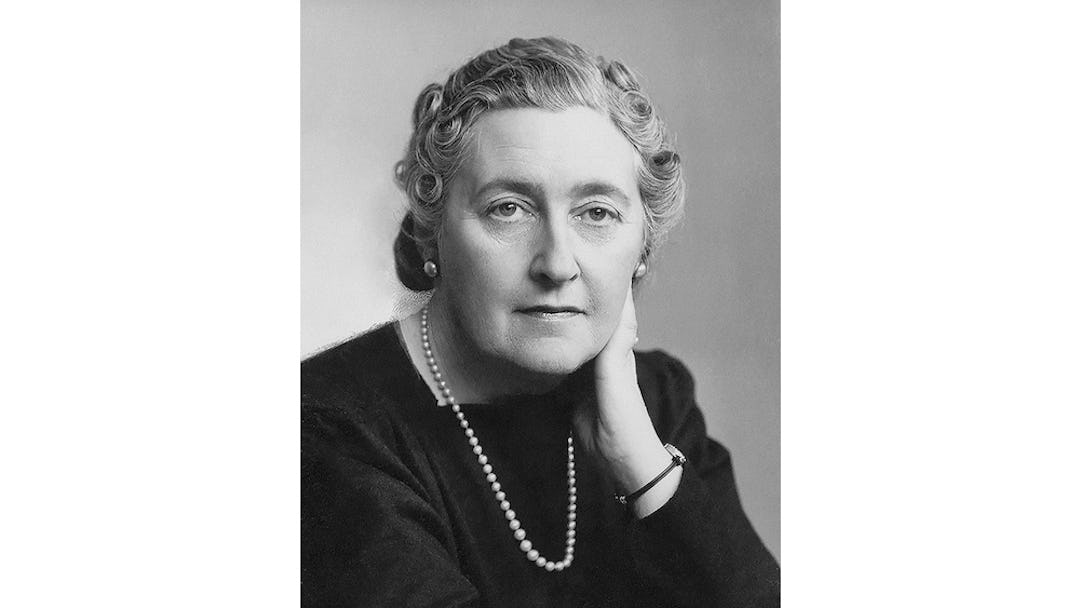Queen of Crime Agatha Christie was born on this day in 1890, and fans are celebrating the doyenne of the “cozy mystery.” Though her many novels often take place in country houses, small villages, or among groups of travelers, they’re really anything but cozy. Her characters stab, shoot, and poison with alarming frequency and impunity, and she effectively engineers a sense of mortal dread in close quarters. To celebrate her enduring legacy, we offer her most diabolical plot twists, her cleverest endings, and her craziest killers.
Warning: There are major spoilers throughout. We’ve put extra spoiler alerts in front of the summaries that really ruin the experience of reading, but proceed with caution.
Death on the Nile
A love triangle, a crazed stalking, a dead heiress, and a packed-to-the-hilt Egyptian cruise make this one of Christie’s most delightfully atmospheric and incredibly tense novels. What’s amazing about the final twist isn’t solely the whodunnit, but the fact that Hercule Poirot manages to uncover something secret or sinister about every single one of his fellow passengers. In Christie’s world, it turns out that very few people embark on Nile cruises without something to conceal.
And Then There Were None
Christie’s gruesome masterpiece (with an unfortunately racist series of original titles) is the world’s bestselling mystery for a reason. Here’s the twist: you think the ten characters are being plucked off one by one — and they are, for the most part — but the killer turns out to be someone we thought was offed somewhere in the sequence, his “death” faked with help from an unwitting future victim. A classic example of Christie’s many “he wasn’t really dead!” twists. Eventually, the killer’s confession washes to shore in a bottle.
The Murder of Roger Ackroyd
Extra spoiler alert: Seriously, don’t read this one if you want to read the book.
Here comes Christie’s most brilliant, unfathomable, and memorable twist: the killer is the very narrator of the book’s account, who has created a narrative that carefully glosses over self-incriminating detail. Our protagonist even assists Hercule Poirot, hoping to foil the master detective, but Poirot proves too smart even for this cleverest of criminals.
Murder on the Orient Express
Extra spoiler alert.
Like in Death on the Nile, all the passengers on this famous train trip have something to hide. But in this case, Hercule Poirot realizes they’re likely all hiding the same thing. In Christie’s most wonderfully improbable twist, almost all the suspects turn out to be co-collaborators to murder — although what Poirot chooses to do with this information is another surprise.
Five Little Pigs or Murder in Retrospect
Some of my favorite Christie novels are ones, like Five Little Pigs and Sleeping Murder, that revisit a long-ago crime that was thought to be solved. In this case, Poirot’s reinvestigation of an age-old murder mystery leads him to a very new suspect, his discovery hinging on an artist’s portrait that is deeply revealing in more ways than one. The twist: Poirot can’t prove what he’s found in a court of law. All he can do is confront the killer. The novel ends with him watching the murderer return to her life, unhappy.
Crooked House
This bizarre novel’s ending is more shocking for its ultimate motive than the killer’s identity. Imagine killing your guardian because he or she won’t pay for your dance lessons!
The Murder at the Vicarage
Miss Marple’s first case. Christie introduces the spinster with a head for solving crime and her gossip-filled village of St. Mary Mead. At the outset, two confessions seem to contradict each other; the twist is that the suspects were actually in cahoots. But the real oomph of the novel comes from meeting Miss Marple and watching her at work.
Why Didn’t They Ask Evans?
One of Christie’s Marple- and Poirot-free novels, featuring amateur sleuths who are young, in love, and get themselves in quite a bit danger as they follow the case of the dying man on the cliff who asked the titular questions. There are so many twists and mistaken identities that it’s hard to sum them each up; yet the best surprise is that Evans turns out to be a woman, and of course a key witness to a previous crime.
Curtain: Poirot’s Last Case
Extra spoiler alert.
Halfway through this final Poirot mystery, the detective dies of a heart attack and is mourned. But wait! He’s left a confession, which arrives in the mail. Turns out that, at the end of his distinguished life, the master detective turned stone-cold killer himself — but only to prevent more murders. Ah, how readers would miss the fussy, brilliant Belgian after the curtain fell.
A Murder Is Announced
A murder-mystery dinner party turns into the real thing in this Marple mystery, a classic example of a novel not unlike The Murder at the Vicarage, in which Christie leads you so far away from an obvious choice (the person throwing said party), only to lead you right back at the very end. Count on Miss Marple to see the significance in the difference between very British names like Lettie and Lottie.
